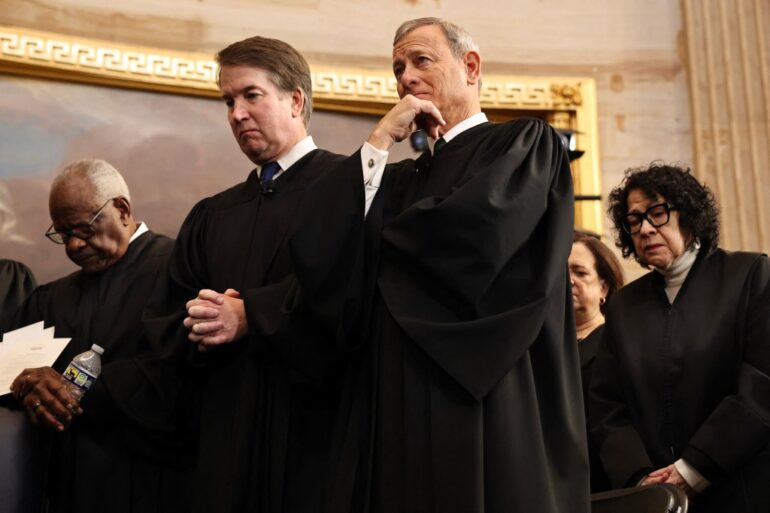🔴 Website 👉 https://u-s-news.com/
Telegram 👉 https://t.me/usnewscom_channel
“A number of judges have seemingly adopted a constitutional meta-principle: what a past President did, President Trump may not undo.”
So wrote Harvard Law professor and constitutional scholar Adrian Vermeule on Friday after a district court judge issued yet another lawless nationwide injunction meant to handcuff Trump and halt his agenda.
It’s a criticism that the Supreme Court, and particularly Chief Justice John Roberts, must take to heart.
One of the hallmarks of Roberts’ term has been an overweening desire to guard the judicial branch’s “legitimacy.”
But Roberts seems oblivious to the fact that the biggest threat to the courts’ legitimacy comes from the courts themselves — and his desire to preserve the judiciary’s standing with a small circle of Washington and academic insiders.
We saw that as far back as 2012, when Roberts switched sides in the case against Obamacare at the last minute, for fear that striking down that unprecedented bill would upset the DC apple cart and harm the court’s legitimacy.
Instead, it was a self-inflicted wound. Nobody respects a trimmer.
Roberts’ Obamacare decision wasn’t rooted in the Constitution, but an attempt to have it both ways, giving the Democrats enough of a victory to keep them from declaring war.
And we’ve seen that sort of thing repeatedly in the years since.
Roberts seems less concerned with preserving the court’s legitimacy in the eyes of America’s citizens, and more with the views of the editorial pages of the New York Times and the Washington Post, plus some Ivy League law professors whose schools’ decaying reputations should give him pause.
But now the flurry of lower-court interference is reaching crisis proportions, say Harvard’s Vermeule and others.
The prime issue, among others, is the illegal — and yes, it was contrary to the statutes on the books — Biden administration policy to admit millions of unvetted migrants into the country, and to allow them to stay here.
The “rule of law” didn’t matter then, because the crowd to which Roberts defers was in favor of open borders and its massive influx of a low-wage, government-dependent underclass.
Biden’s border policy has never been popular with the public, but the public isn’t Roberts’ concern: When he worries about legitimacy, he’s really thinking peer opinion — the “Mean Girls” judiciary.
“People Who Bypassed Legal Process in Migrating to USA Demand Legal Process Before Being Kicked Out,” as the Babylon Bee parody site put it.
This came to a head early Saturday as Roberts and six colleagues stepped in to temporarily uphold a lower-court opinion interfering with Trump’s deportations.
The Supremes acted one-sidedly and with untoward swiftness to block the president — in accordance, it seems, with Vermeule’s dictum.
But don’t take my word for it. Here’s what Justice Samuel Alito said, in a blazing dissent:
“Literally in the middle of the night, the Court issued unprecedented and legally questionable relief without giving the lower courts a chance to rule, without hearing from the opposing party, within eight hours of receiving the application, with dubious factual support for its order, and without providing any explanation.”
The court may make much of the “rule of law,” Alito noted — but “both the Executive and the Judiciary have an obligation to follow the law.”
The court’s irregular behavior here brings that into serious question.
It’s not clear that the justices had any jurisdiction to rule in this case at all, as Alito pointed out — much less with such unseemly haste.
And unseemly is a good description for the judiciary’s behavior here in general.
From excessively easy forum-shopping — anti-Trump DC District Judge James Boasberg and others seem to get “randomly” assigned to an awful lot of high-profile cases lately — to intemperate language, rushed rulings and a palpable hostility to Trump, the judiciary doesn’t seem to be calling “balls and strikes,” as Roberts likes to say.
Instead, it’s giving the impression of going to bat for one team.
This has played well with the legacy media — that is, the media whose opinion Roberts views as legitimate.
But it doesn’t look so good to a lot of other people. And their opinions matter too.
By design, and for good reason, the courts are insulated from the daily ebb and flow of politics.
But they aren’t, and can’t be, and shouldn’t be, entirely insulated from the tides of public opinion.
The public’s respect for the Supreme Court has been dropping over recent years, even as Roberts has worried endlessly about appearances.
The judiciary has neither the sword nor the purse, only judgment and reputation. If it abandons its objectivity for partisanship, what reason is there to heed it?
If this continues, it’s likely to be reflected in judicial appointments and legislation that the chief will find uncongenial.
He and the courts will deserve such changes. But America deserves better.
Glenn Harlan Reynolds is a professor of law at the University of Tennessee and founder of the InstaPundit.com blog.

